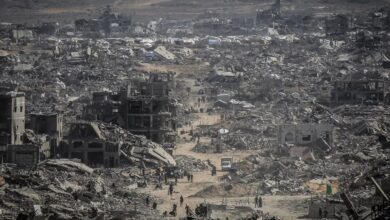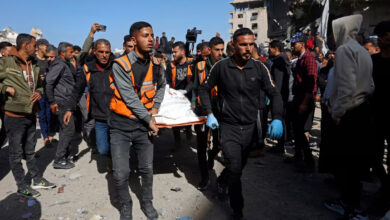Gaza City – Dozens of Gazans stormed the gates of Rafah Saturday morning, witnesses said, in protest over Egypt’s decision to shut the border crossing, the first such move since opening Rafah a week ago.
"The Egyptian authorities closed the Rafah border surprisingly today…they stopped the buses of passengers from entering the Egyptian hall," said head of the Hamas police unit at Rafah, Ayyoub Abu Sha'ar, in a statement.
Abu Sha'ar said Gaza authorities were shocked by the decision and tried to contact their Egyptian counterparts but received no answer.
"The Egyptians closed the border without giving previous notification nor explanation to the Palestinian side," the statement added.
Those seeking to cross, many of whom had been waiting in their buses for hours, received the news with great disappointment. Aside from those who sought to force the gate open, some chanted friendly slogans requesting the crossing’s reopening.
Salama Baraka, Hamas officer on the border, said he believes the decision was made because maintenance work was needed rather than the presence of a political motive, a belief echoed by Egyptian security sources.
"I trust Egypt good intension and I wish tomorrow the border will reopen again," he said during a press conference at Rafah.
Egyptian state television said the border reopened later in the day but Palestinian officials, according to AFP news agency, said the movement was only one-way.
Mohammed al-Farra said he came to the border on Saturday after registering his name and scheduling a crossing.
"I, like all the passengers here, received the news with big disappointment and frustration," said al-Farra.
The Egyptian decision to open Gaza’s only border point with Egypt follows years of siege imposed by both Israel and Egypt on the coastal enclave.
But problems started with the border traffic by mid-week. According to Hamas officer at the border, Salama Baraka, only 150 of 400 Gazans seeking entry into Egypt on Wednesday were permitted to cross. By Thursday, the droves of passengers flooding the border started to agitate Egyptian officials and the denial of people blacklisted over security concerns angered Hamas.
"Since Tuesday, we are witnessing some restrictions imposed by the Egyptians on the work of the border,” said Baraka. “They are almost paralyzing the movement of the passengers in a way that's similar to the old condition of the border."
Hamas accused Egyptian authorities of failing to implement the opening it announced a week ago, while urging Egypt to lift the demographic restrictions on admission. Men between the ages of 18 and 40 are not permitted to cross. Others require security clearance.
Hamas Deputy Foreign Minister Ghazi Hamad said his party, the authority in Gaza since it forcibly ousted Fatah personnel in 2007, earlier contacted the Egyptian government for clarification.
"We have difficulties on the ground," he said earlier in the week.
Negotiations several days ago, following an exchange of accusations, settled on the allowance of 400 passengers to pass daily on the condition their names be submitted to Egyptian authorities 24 hours in advance.
Priority has been given for both students and patients seeking medical treatment. Regarding students, preference is given to those already enrolled in outside universities over those merely accepted. The negotiations require patients be examined by an Egyptian medical committee before entry is permitted.
According to Maan, a local news agency, Egyptian officials said Hamas is working against agreed upon stipulations by sending some blacklisted people to the border.
A witness, who requested anonymity due to the sensitive nature of the situation, told Al-Masry Al-Youm he received clearance from the Palestinian side to go with his sick brother to Egypt, but when he reached the Egyptian hall he found his name was blacklisted for security reasons.
"They allowed my brother in but rejected me," he said.
Sari Bashi, executive director of Gisha, the Israeli human rights group focused on freedom of movement for Palestinians, said Egypt told Hamas on Tuesday crossings would be limited to 400 daily and that everyone, including women and children, were required to submit their names a day in advance.
Before the Hamas takeover of Gaza, under a system that included European monitors from November 2005 to June 2006, about 660 people crossed into Egypt daily, according to Gisha.
Israel first restricted crossing at Rafah and commodity imports from Israel in 2006 after Hamas kidnapped an Israeli soldier near Gaza. A year later, following elections that gave Hamas parliamentary majority, the group seized full control of the territory.
And last year, after Israeli commandos killed nine activists on a Turkish flotilla trying to break Israel’s siege of Gaza, Egypt opened Rafah on a more regular basis. Israel also began allowing a larger range of goods to enter Gaza from Israel.
Yasser Othman, the Egyptian ambassador in Ramallah, told reporters on Saturday that the Egyptian decision to open the border is still in effect. The problems associated with the restrictions and temporary closure, he said, can be solved through bilateral coordination.




